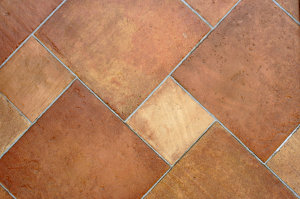The choices consumers face when buying ceramic tile flooring are nothing short of astounding: pastels to bright colors; soft designs or edgy geometric shapes; smooth or textured surfaces; glossy, matte, or satin finishes; consistent or high-shade variations; tiny, small, medium or large tiles; and, finally, various thicknesses of the materials. It pays to do some online research prior to stepping into a home-improvement center as the broad selection of ceramic tiles may overwhelm the unprepared buyer.

Homeowners and decorators should keep in mind a few practicalities when considering ceramic tile for use on floors: variegated coloring shows less dirt, and non-slip coatings or matte finishes are safest.
The choice of tile sizes range from 3x3 inches to 16x16 inches with smaller tiles (less than one inch square) also available, although these come in sheets in which the small tiles are attached to a backing to make them easier to install. Prices are dependent on the materials used and usually start at about $3 a square foot and may go up to $30 a square foot at home improvement centers. These prices do not include the cost of installation.
The ceramic tile flooring category includes all manufactured material made by compacting clay dust. These include glazed tiles, mosaic tiles, and porcelain tiles.
All tiles may be glazed using high-gloss, matte, or abrasive slip-resistant finishes which are highly recommended in rooms that are likely to become wet. The glaze protects the tile from stains, dirt, and scratches and also makes the floor easier to clean.
Mosaic tiles are made from clay of different colors, so chips and scratches will not show as much as those with only a surface tinting applied as part of the manufacturing process. They are available in either glazed or unglazed finishes that will help resist moisture.
The hardest and, therefore, strongest floor tile is made of porcelain which is kiln-fired at extreme temperatures. It is the best choice for kitchens, bathrooms, and other high-traffic areas as they are more easily maintained, and are more wear and water-resistant.
Manufacturers' warranties vary depending on the company but most will offer coverage against fading, wear-through, and manufacturers. defects. The warranties will often state that only those tiles needing replacement will be substituted with new ones (not the entire floor). Professional flooring installers provide their own warranties covering their work.
The greatest advantage of ceramic tiles is that they are easy to keep clean. Sweeping and mopping regularly will keep them looking good without much effort. They are also more durable than many flooring materials and have a natural resistance to fire, frost, moisture, and stains.
Chipped, scratched, and cracked tiles are the most frequent complaints homeowners have about ceramic flooring. These problems may be caused by the sudden impact of a heavy object dropped, furniture pushed (not lifted) on the floor, and sharp edges meeting the smooth surface of the flooring material. At times, poor installation results in tiles cracking or chipping at the edges. Loosened and stained grout can also occur and may need to be repaired. Tile floors are cold to the touch but area rugs can ensure that bare feet do not touch the floor -- especially in bathrooms where a cold floor can be particularly undesirable.
Recycled tiles manufactured using both pre-consumer and post-consumer materials are making ceramic tiles a green alternative for home floors. Glass, stone, dirt, dust, and even plastic is being combined to create tiles; however, the manufacturing of any type of ceramic tile requires extreme heat and high energy use.